Company Law Report: Cafe Finix, SME, and Shareholder Rights
VerifiedAdded on 2020/06/06
|10
|2603
|57
Report
AI Summary
This report delves into the intricacies of company law, focusing on the legal aspects pertinent to Cafe Finix and small to medium-sized enterprises (SMEs). It explores the concepts of corporate personality, including lifting the corporate veil, and the advantages and disadvantages of incorporation. The report outlines the requirements for SME business expansion, covering registration, compliance with regulations, and initial public offerings. It also examines the roles of promoters and pre-incorporation contracts, along with the steps involved in company registration. Financial analysis techniques, such as gross/net profit margin analysis and accounts receivable turnover analysis, are discussed. The report further addresses various types of capital, including authorized, paid-up, and subscribed share capital, and examines the legal aspects of issuing shares. It also covers the duties and powers of directors, rules of meetings, and the legal terms related to minority shareholder protection. Finally, the rights of shareholders and debenture holders are outlined, providing a comprehensive overview of company law principles.

COMPANY LAW
Paraphrase This Document
Need a fresh take? Get an instant paraphrase of this document with our AI Paraphraser

TABLE OF CONTENTS
INTRODUCTION...........................................................................................................................1
TASK 1............................................................................................................................................1
TASK 2A.........................................................................................................................................4
TASK 3............................................................................................................................................4
TASK 4............................................................................................................................................5
CONCLUSION................................................................................................................................6
REFERENCES................................................................................................................................7
INTRODUCTION...........................................................................................................................1
TASK 1............................................................................................................................................1
TASK 2A.........................................................................................................................................4
TASK 3............................................................................................................................................4
TASK 4............................................................................................................................................5
CONCLUSION................................................................................................................................6
REFERENCES................................................................................................................................7
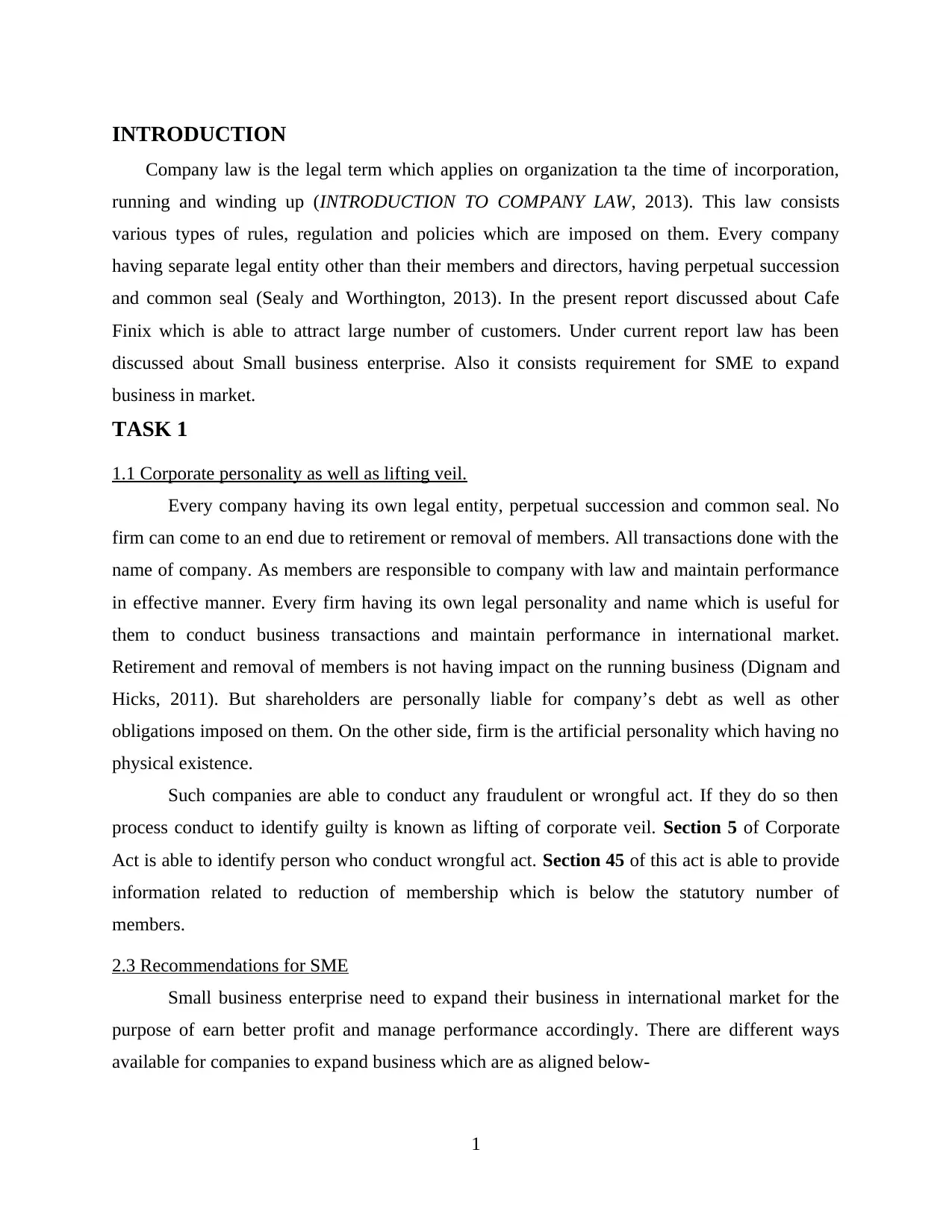
INTRODUCTION
Company law is the legal term which applies on organization ta the time of incorporation,
running and winding up (INTRODUCTION TO COMPANY LAW, 2013). This law consists
various types of rules, regulation and policies which are imposed on them. Every company
having separate legal entity other than their members and directors, having perpetual succession
and common seal (Sealy and Worthington, 2013). In the present report discussed about Cafe
Finix which is able to attract large number of customers. Under current report law has been
discussed about Small business enterprise. Also it consists requirement for SME to expand
business in market.
TASK 1
1.1 Corporate personality as well as lifting veil.
Every company having its own legal entity, perpetual succession and common seal. No
firm can come to an end due to retirement or removal of members. All transactions done with the
name of company. As members are responsible to company with law and maintain performance
in effective manner. Every firm having its own legal personality and name which is useful for
them to conduct business transactions and maintain performance in international market.
Retirement and removal of members is not having impact on the running business (Dignam and
Hicks, 2011). But shareholders are personally liable for company’s debt as well as other
obligations imposed on them. On the other side, firm is the artificial personality which having no
physical existence.
Such companies are able to conduct any fraudulent or wrongful act. If they do so then
process conduct to identify guilty is known as lifting of corporate veil. Section 5 of Corporate
Act is able to identify person who conduct wrongful act. Section 45 of this act is able to provide
information related to reduction of membership which is below the statutory number of
members.
2.3 Recommendations for SME
Small business enterprise need to expand their business in international market for the
purpose of earn better profit and manage performance accordingly. There are different ways
available for companies to expand business which are as aligned below-
1
Company law is the legal term which applies on organization ta the time of incorporation,
running and winding up (INTRODUCTION TO COMPANY LAW, 2013). This law consists
various types of rules, regulation and policies which are imposed on them. Every company
having separate legal entity other than their members and directors, having perpetual succession
and common seal (Sealy and Worthington, 2013). In the present report discussed about Cafe
Finix which is able to attract large number of customers. Under current report law has been
discussed about Small business enterprise. Also it consists requirement for SME to expand
business in market.
TASK 1
1.1 Corporate personality as well as lifting veil.
Every company having its own legal entity, perpetual succession and common seal. No
firm can come to an end due to retirement or removal of members. All transactions done with the
name of company. As members are responsible to company with law and maintain performance
in effective manner. Every firm having its own legal personality and name which is useful for
them to conduct business transactions and maintain performance in international market.
Retirement and removal of members is not having impact on the running business (Dignam and
Hicks, 2011). But shareholders are personally liable for company’s debt as well as other
obligations imposed on them. On the other side, firm is the artificial personality which having no
physical existence.
Such companies are able to conduct any fraudulent or wrongful act. If they do so then
process conduct to identify guilty is known as lifting of corporate veil. Section 5 of Corporate
Act is able to identify person who conduct wrongful act. Section 45 of this act is able to provide
information related to reduction of membership which is below the statutory number of
members.
2.3 Recommendations for SME
Small business enterprise need to expand their business in international market for the
purpose of earn better profit and manage performance accordingly. There are different ways
available for companies to expand business which are as aligned below-
1
⊘ This is a preview!⊘
Do you want full access?
Subscribe today to unlock all pages.

Trusted by 1+ million students worldwide
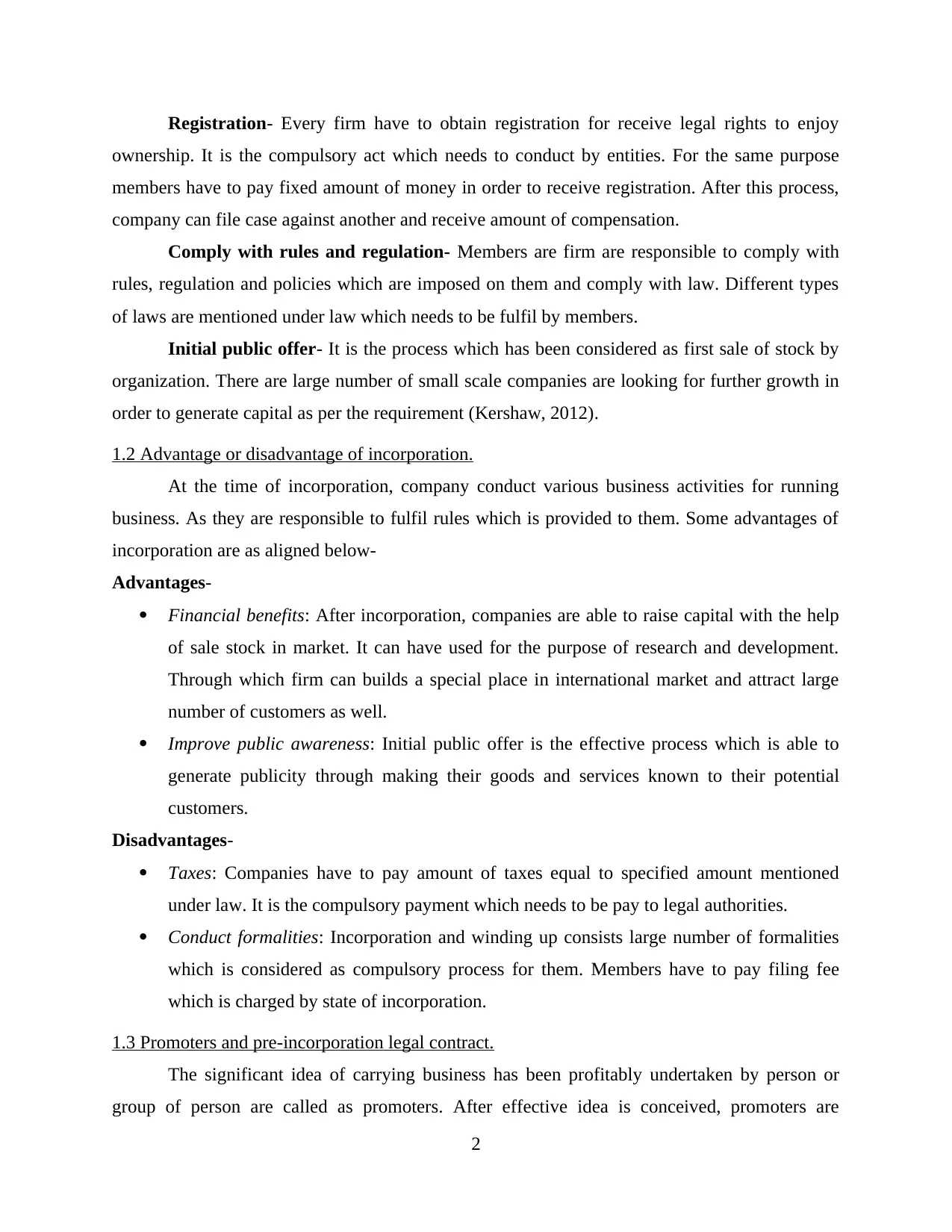
Registration- Every firm have to obtain registration for receive legal rights to enjoy
ownership. It is the compulsory act which needs to conduct by entities. For the same purpose
members have to pay fixed amount of money in order to receive registration. After this process,
company can file case against another and receive amount of compensation.
Comply with rules and regulation- Members are firm are responsible to comply with
rules, regulation and policies which are imposed on them and comply with law. Different types
of laws are mentioned under law which needs to be fulfil by members.
Initial public offer- It is the process which has been considered as first sale of stock by
organization. There are large number of small scale companies are looking for further growth in
order to generate capital as per the requirement (Kershaw, 2012).
1.2 Advantage or disadvantage of incorporation.
At the time of incorporation, company conduct various business activities for running
business. As they are responsible to fulfil rules which is provided to them. Some advantages of
incorporation are as aligned below-
Advantages-
Financial benefits: After incorporation, companies are able to raise capital with the help
of sale stock in market. It can have used for the purpose of research and development.
Through which firm can builds a special place in international market and attract large
number of customers as well.
Improve public awareness: Initial public offer is the effective process which is able to
generate publicity through making their goods and services known to their potential
customers.
Disadvantages-
Taxes: Companies have to pay amount of taxes equal to specified amount mentioned
under law. It is the compulsory payment which needs to be pay to legal authorities.
Conduct formalities: Incorporation and winding up consists large number of formalities
which is considered as compulsory process for them. Members have to pay filing fee
which is charged by state of incorporation.
1.3 Promoters and pre-incorporation legal contract.
The significant idea of carrying business has been profitably undertaken by person or
group of person are called as promoters. After effective idea is conceived, promoters are
2
ownership. It is the compulsory act which needs to conduct by entities. For the same purpose
members have to pay fixed amount of money in order to receive registration. After this process,
company can file case against another and receive amount of compensation.
Comply with rules and regulation- Members are firm are responsible to comply with
rules, regulation and policies which are imposed on them and comply with law. Different types
of laws are mentioned under law which needs to be fulfil by members.
Initial public offer- It is the process which has been considered as first sale of stock by
organization. There are large number of small scale companies are looking for further growth in
order to generate capital as per the requirement (Kershaw, 2012).
1.2 Advantage or disadvantage of incorporation.
At the time of incorporation, company conduct various business activities for running
business. As they are responsible to fulfil rules which is provided to them. Some advantages of
incorporation are as aligned below-
Advantages-
Financial benefits: After incorporation, companies are able to raise capital with the help
of sale stock in market. It can have used for the purpose of research and development.
Through which firm can builds a special place in international market and attract large
number of customers as well.
Improve public awareness: Initial public offer is the effective process which is able to
generate publicity through making their goods and services known to their potential
customers.
Disadvantages-
Taxes: Companies have to pay amount of taxes equal to specified amount mentioned
under law. It is the compulsory payment which needs to be pay to legal authorities.
Conduct formalities: Incorporation and winding up consists large number of formalities
which is considered as compulsory process for them. Members have to pay filing fee
which is charged by state of incorporation.
1.3 Promoters and pre-incorporation legal contract.
The significant idea of carrying business has been profitably undertaken by person or
group of person are called as promoters. After effective idea is conceived, promoters are
2
Paraphrase This Document
Need a fresh take? Get an instant paraphrase of this document with our AI Paraphraser
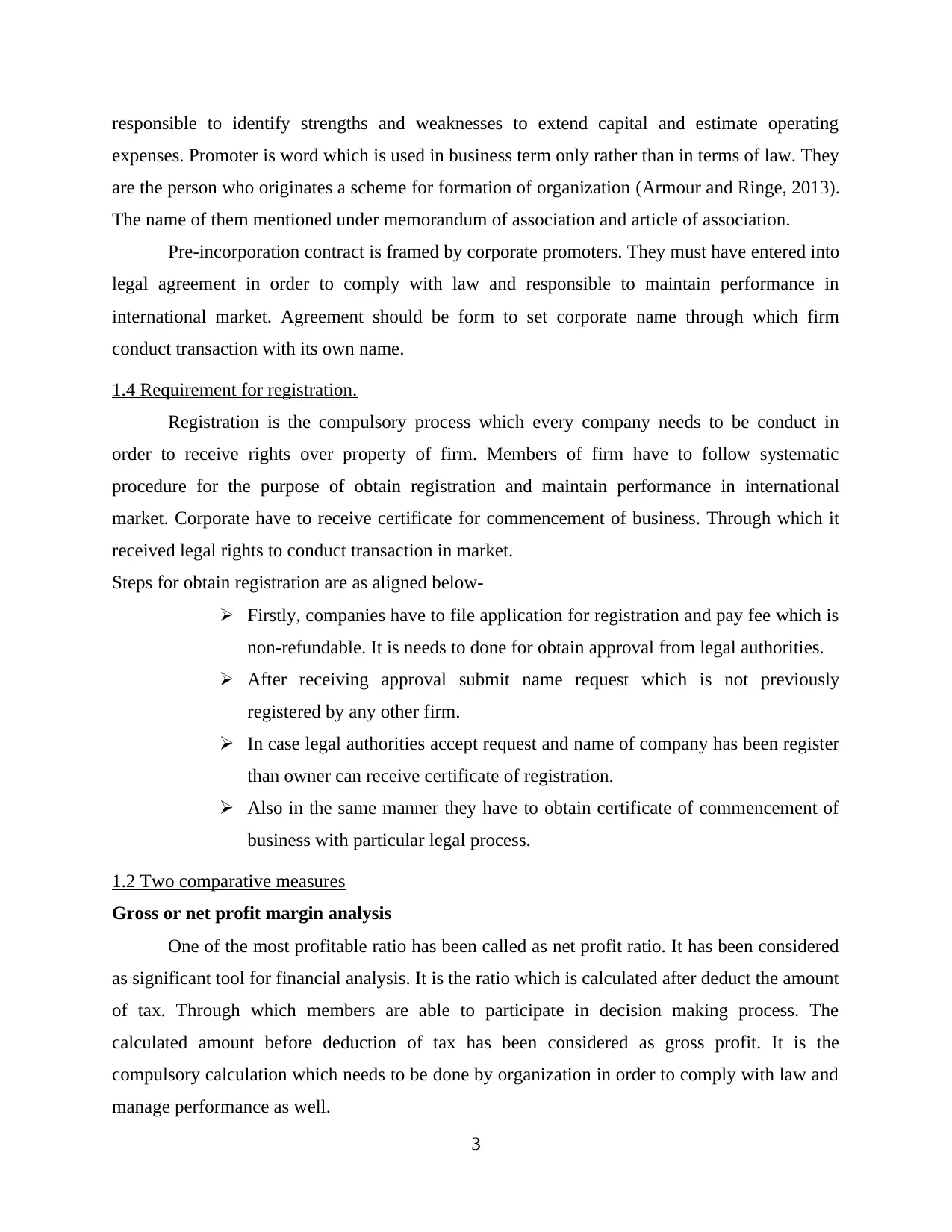
responsible to identify strengths and weaknesses to extend capital and estimate operating
expenses. Promoter is word which is used in business term only rather than in terms of law. They
are the person who originates a scheme for formation of organization (Armour and Ringe, 2013).
The name of them mentioned under memorandum of association and article of association.
Pre-incorporation contract is framed by corporate promoters. They must have entered into
legal agreement in order to comply with law and responsible to maintain performance in
international market. Agreement should be form to set corporate name through which firm
conduct transaction with its own name.
1.4 Requirement for registration.
Registration is the compulsory process which every company needs to be conduct in
order to receive rights over property of firm. Members of firm have to follow systematic
procedure for the purpose of obtain registration and maintain performance in international
market. Corporate have to receive certificate for commencement of business. Through which it
received legal rights to conduct transaction in market.
Steps for obtain registration are as aligned below-
Firstly, companies have to file application for registration and pay fee which is
non-refundable. It is needs to done for obtain approval from legal authorities.
After receiving approval submit name request which is not previously
registered by any other firm.
In case legal authorities accept request and name of company has been register
than owner can receive certificate of registration.
Also in the same manner they have to obtain certificate of commencement of
business with particular legal process.
1.2 Two comparative measures
Gross or net profit margin analysis
One of the most profitable ratio has been called as net profit ratio. It has been considered
as significant tool for financial analysis. It is the ratio which is calculated after deduct the amount
of tax. Through which members are able to participate in decision making process. The
calculated amount before deduction of tax has been considered as gross profit. It is the
compulsory calculation which needs to be done by organization in order to comply with law and
manage performance as well.
3
expenses. Promoter is word which is used in business term only rather than in terms of law. They
are the person who originates a scheme for formation of organization (Armour and Ringe, 2013).
The name of them mentioned under memorandum of association and article of association.
Pre-incorporation contract is framed by corporate promoters. They must have entered into
legal agreement in order to comply with law and responsible to maintain performance in
international market. Agreement should be form to set corporate name through which firm
conduct transaction with its own name.
1.4 Requirement for registration.
Registration is the compulsory process which every company needs to be conduct in
order to receive rights over property of firm. Members of firm have to follow systematic
procedure for the purpose of obtain registration and maintain performance in international
market. Corporate have to receive certificate for commencement of business. Through which it
received legal rights to conduct transaction in market.
Steps for obtain registration are as aligned below-
Firstly, companies have to file application for registration and pay fee which is
non-refundable. It is needs to done for obtain approval from legal authorities.
After receiving approval submit name request which is not previously
registered by any other firm.
In case legal authorities accept request and name of company has been register
than owner can receive certificate of registration.
Also in the same manner they have to obtain certificate of commencement of
business with particular legal process.
1.2 Two comparative measures
Gross or net profit margin analysis
One of the most profitable ratio has been called as net profit ratio. It has been considered
as significant tool for financial analysis. It is the ratio which is calculated after deduct the amount
of tax. Through which members are able to participate in decision making process. The
calculated amount before deduction of tax has been considered as gross profit. It is the
compulsory calculation which needs to be done by organization in order to comply with law and
manage performance as well.
3
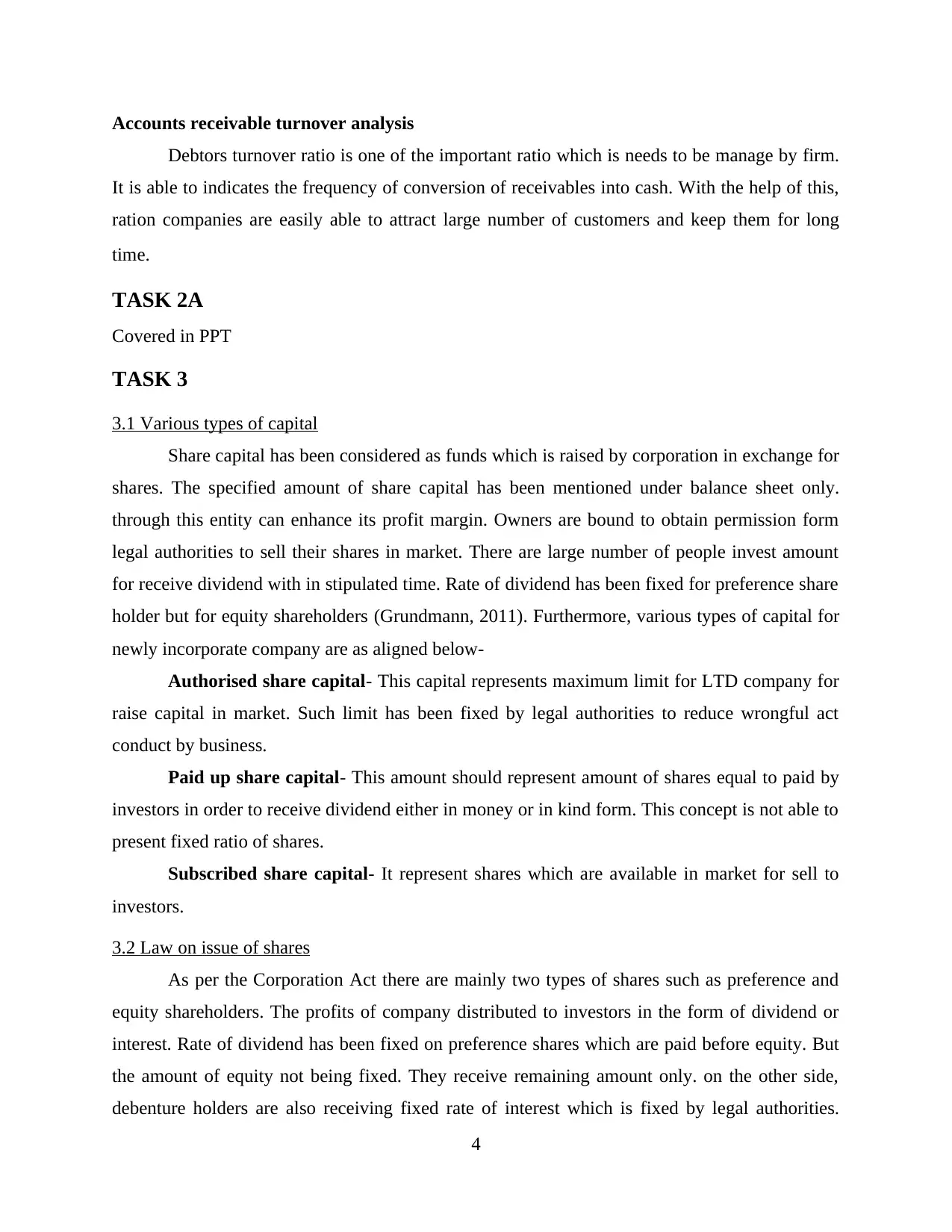
Accounts receivable turnover analysis
Debtors turnover ratio is one of the important ratio which is needs to be manage by firm.
It is able to indicates the frequency of conversion of receivables into cash. With the help of this,
ration companies are easily able to attract large number of customers and keep them for long
time.
TASK 2A
Covered in PPT
TASK 3
3.1 Various types of capital
Share capital has been considered as funds which is raised by corporation in exchange for
shares. The specified amount of share capital has been mentioned under balance sheet only.
through this entity can enhance its profit margin. Owners are bound to obtain permission form
legal authorities to sell their shares in market. There are large number of people invest amount
for receive dividend with in stipulated time. Rate of dividend has been fixed for preference share
holder but for equity shareholders (Grundmann, 2011). Furthermore, various types of capital for
newly incorporate company are as aligned below-
Authorised share capital- This capital represents maximum limit for LTD company for
raise capital in market. Such limit has been fixed by legal authorities to reduce wrongful act
conduct by business.
Paid up share capital- This amount should represent amount of shares equal to paid by
investors in order to receive dividend either in money or in kind form. This concept is not able to
present fixed ratio of shares.
Subscribed share capital- It represent shares which are available in market for sell to
investors.
3.2 Law on issue of shares
As per the Corporation Act there are mainly two types of shares such as preference and
equity shareholders. The profits of company distributed to investors in the form of dividend or
interest. Rate of dividend has been fixed on preference shares which are paid before equity. But
the amount of equity not being fixed. They receive remaining amount only. on the other side,
debenture holders are also receiving fixed rate of interest which is fixed by legal authorities.
4
Debtors turnover ratio is one of the important ratio which is needs to be manage by firm.
It is able to indicates the frequency of conversion of receivables into cash. With the help of this,
ration companies are easily able to attract large number of customers and keep them for long
time.
TASK 2A
Covered in PPT
TASK 3
3.1 Various types of capital
Share capital has been considered as funds which is raised by corporation in exchange for
shares. The specified amount of share capital has been mentioned under balance sheet only.
through this entity can enhance its profit margin. Owners are bound to obtain permission form
legal authorities to sell their shares in market. There are large number of people invest amount
for receive dividend with in stipulated time. Rate of dividend has been fixed for preference share
holder but for equity shareholders (Grundmann, 2011). Furthermore, various types of capital for
newly incorporate company are as aligned below-
Authorised share capital- This capital represents maximum limit for LTD company for
raise capital in market. Such limit has been fixed by legal authorities to reduce wrongful act
conduct by business.
Paid up share capital- This amount should represent amount of shares equal to paid by
investors in order to receive dividend either in money or in kind form. This concept is not able to
present fixed ratio of shares.
Subscribed share capital- It represent shares which are available in market for sell to
investors.
3.2 Law on issue of shares
As per the Corporation Act there are mainly two types of shares such as preference and
equity shareholders. The profits of company distributed to investors in the form of dividend or
interest. Rate of dividend has been fixed on preference shares which are paid before equity. But
the amount of equity not being fixed. They receive remaining amount only. on the other side,
debenture holders are also receiving fixed rate of interest which is fixed by legal authorities.
4
⊘ This is a preview!⊘
Do you want full access?
Subscribe today to unlock all pages.

Trusted by 1+ million students worldwide
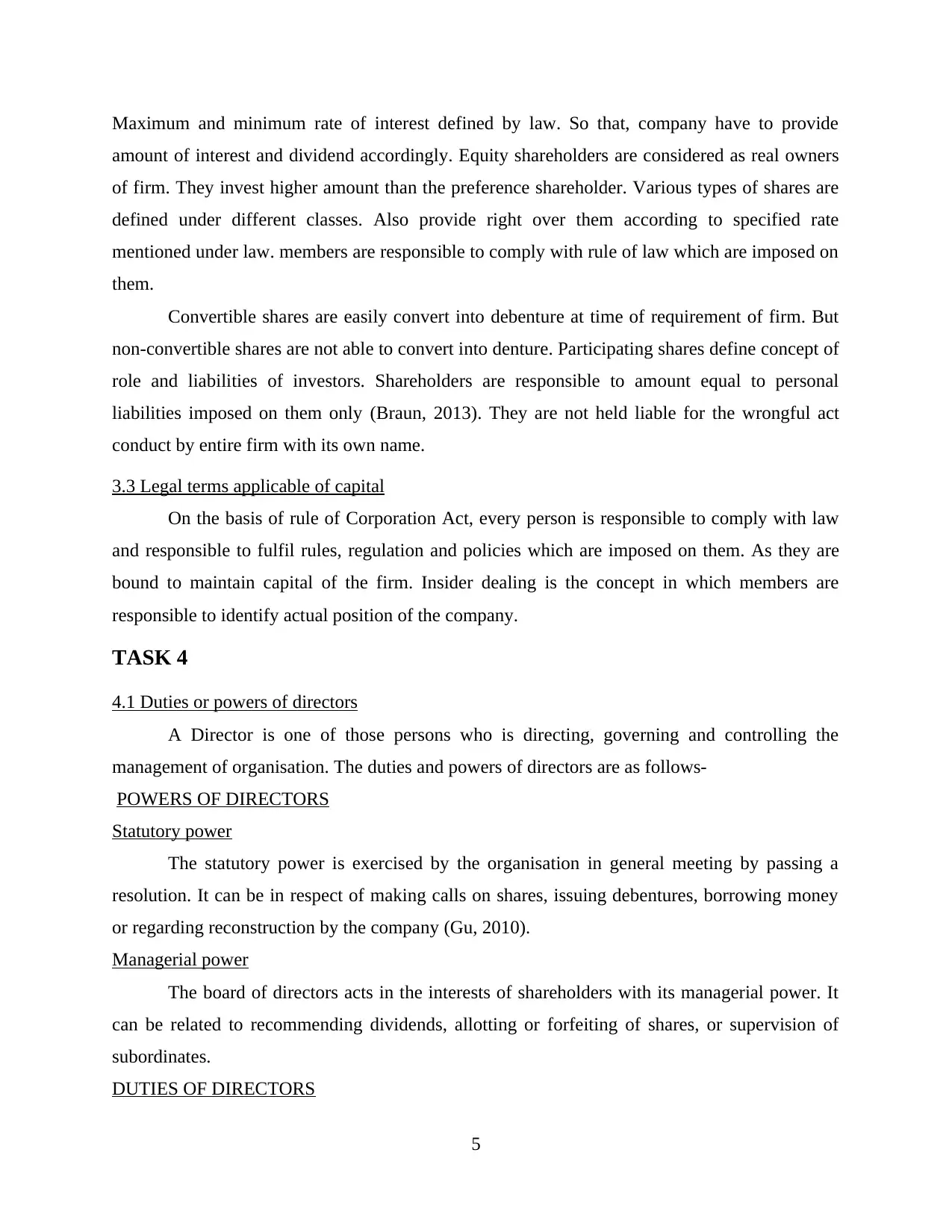
Maximum and minimum rate of interest defined by law. So that, company have to provide
amount of interest and dividend accordingly. Equity shareholders are considered as real owners
of firm. They invest higher amount than the preference shareholder. Various types of shares are
defined under different classes. Also provide right over them according to specified rate
mentioned under law. members are responsible to comply with rule of law which are imposed on
them.
Convertible shares are easily convert into debenture at time of requirement of firm. But
non-convertible shares are not able to convert into denture. Participating shares define concept of
role and liabilities of investors. Shareholders are responsible to amount equal to personal
liabilities imposed on them only (Braun, 2013). They are not held liable for the wrongful act
conduct by entire firm with its own name.
3.3 Legal terms applicable of capital
On the basis of rule of Corporation Act, every person is responsible to comply with law
and responsible to fulfil rules, regulation and policies which are imposed on them. As they are
bound to maintain capital of the firm. Insider dealing is the concept in which members are
responsible to identify actual position of the company.
TASK 4
4.1 Duties or powers of directors
A Director is one of those persons who is directing, governing and controlling the
management of organisation. The duties and powers of directors are as follows-
POWERS OF DIRECTORS
Statutory power
The statutory power is exercised by the organisation in general meeting by passing a
resolution. It can be in respect of making calls on shares, issuing debentures, borrowing money
or regarding reconstruction by the company (Gu, 2010).
Managerial power
The board of directors acts in the interests of shareholders with its managerial power. It
can be related to recommending dividends, allotting or forfeiting of shares, or supervision of
subordinates.
DUTIES OF DIRECTORS
5
amount of interest and dividend accordingly. Equity shareholders are considered as real owners
of firm. They invest higher amount than the preference shareholder. Various types of shares are
defined under different classes. Also provide right over them according to specified rate
mentioned under law. members are responsible to comply with rule of law which are imposed on
them.
Convertible shares are easily convert into debenture at time of requirement of firm. But
non-convertible shares are not able to convert into denture. Participating shares define concept of
role and liabilities of investors. Shareholders are responsible to amount equal to personal
liabilities imposed on them only (Braun, 2013). They are not held liable for the wrongful act
conduct by entire firm with its own name.
3.3 Legal terms applicable of capital
On the basis of rule of Corporation Act, every person is responsible to comply with law
and responsible to fulfil rules, regulation and policies which are imposed on them. As they are
bound to maintain capital of the firm. Insider dealing is the concept in which members are
responsible to identify actual position of the company.
TASK 4
4.1 Duties or powers of directors
A Director is one of those persons who is directing, governing and controlling the
management of organisation. The duties and powers of directors are as follows-
POWERS OF DIRECTORS
Statutory power
The statutory power is exercised by the organisation in general meeting by passing a
resolution. It can be in respect of making calls on shares, issuing debentures, borrowing money
or regarding reconstruction by the company (Gu, 2010).
Managerial power
The board of directors acts in the interests of shareholders with its managerial power. It
can be related to recommending dividends, allotting or forfeiting of shares, or supervision of
subordinates.
DUTIES OF DIRECTORS
5
Paraphrase This Document
Need a fresh take? Get an instant paraphrase of this document with our AI Paraphraser
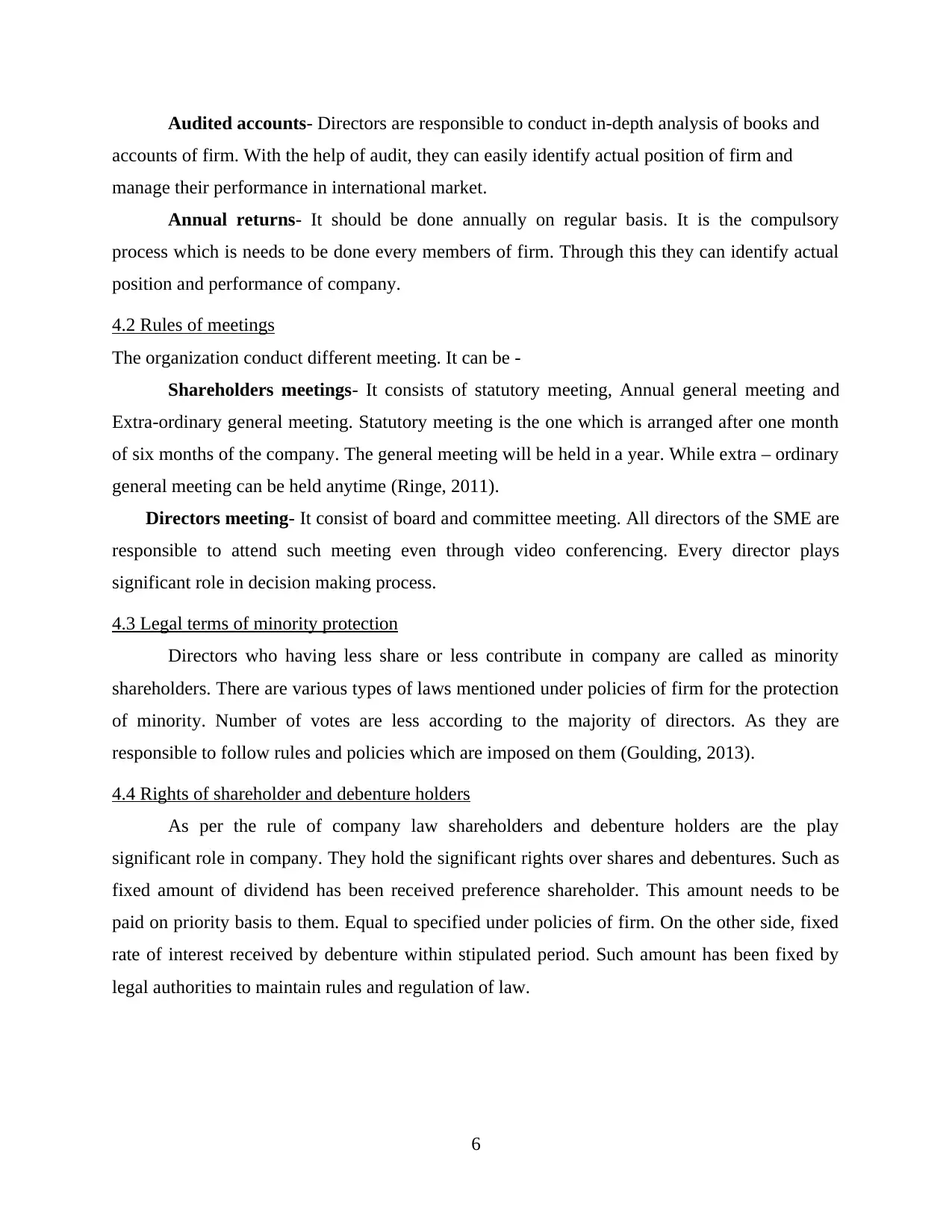
Audited accounts- Directors are responsible to conduct in-depth analysis of books and
accounts of firm. With the help of audit, they can easily identify actual position of firm and
manage their performance in international market.
Annual returns- It should be done annually on regular basis. It is the compulsory
process which is needs to be done every members of firm. Through this they can identify actual
position and performance of company.
4.2 Rules of meetings
The organization conduct different meeting. It can be -
Shareholders meetings- It consists of statutory meeting, Annual general meeting and
Extra-ordinary general meeting. Statutory meeting is the one which is arranged after one month
of six months of the company. The general meeting will be held in a year. While extra – ordinary
general meeting can be held anytime (Ringe, 2011).
Directors meeting- It consist of board and committee meeting. All directors of the SME are
responsible to attend such meeting even through video conferencing. Every director plays
significant role in decision making process.
4.3 Legal terms of minority protection
Directors who having less share or less contribute in company are called as minority
shareholders. There are various types of laws mentioned under policies of firm for the protection
of minority. Number of votes are less according to the majority of directors. As they are
responsible to follow rules and policies which are imposed on them (Goulding, 2013).
4.4 Rights of shareholder and debenture holders
As per the rule of company law shareholders and debenture holders are the play
significant role in company. They hold the significant rights over shares and debentures. Such as
fixed amount of dividend has been received preference shareholder. This amount needs to be
paid on priority basis to them. Equal to specified under policies of firm. On the other side, fixed
rate of interest received by debenture within stipulated period. Such amount has been fixed by
legal authorities to maintain rules and regulation of law.
6
accounts of firm. With the help of audit, they can easily identify actual position of firm and
manage their performance in international market.
Annual returns- It should be done annually on regular basis. It is the compulsory
process which is needs to be done every members of firm. Through this they can identify actual
position and performance of company.
4.2 Rules of meetings
The organization conduct different meeting. It can be -
Shareholders meetings- It consists of statutory meeting, Annual general meeting and
Extra-ordinary general meeting. Statutory meeting is the one which is arranged after one month
of six months of the company. The general meeting will be held in a year. While extra – ordinary
general meeting can be held anytime (Ringe, 2011).
Directors meeting- It consist of board and committee meeting. All directors of the SME are
responsible to attend such meeting even through video conferencing. Every director plays
significant role in decision making process.
4.3 Legal terms of minority protection
Directors who having less share or less contribute in company are called as minority
shareholders. There are various types of laws mentioned under policies of firm for the protection
of minority. Number of votes are less according to the majority of directors. As they are
responsible to follow rules and policies which are imposed on them (Goulding, 2013).
4.4 Rights of shareholder and debenture holders
As per the rule of company law shareholders and debenture holders are the play
significant role in company. They hold the significant rights over shares and debentures. Such as
fixed amount of dividend has been received preference shareholder. This amount needs to be
paid on priority basis to them. Equal to specified under policies of firm. On the other side, fixed
rate of interest received by debenture within stipulated period. Such amount has been fixed by
legal authorities to maintain rules and regulation of law.
6
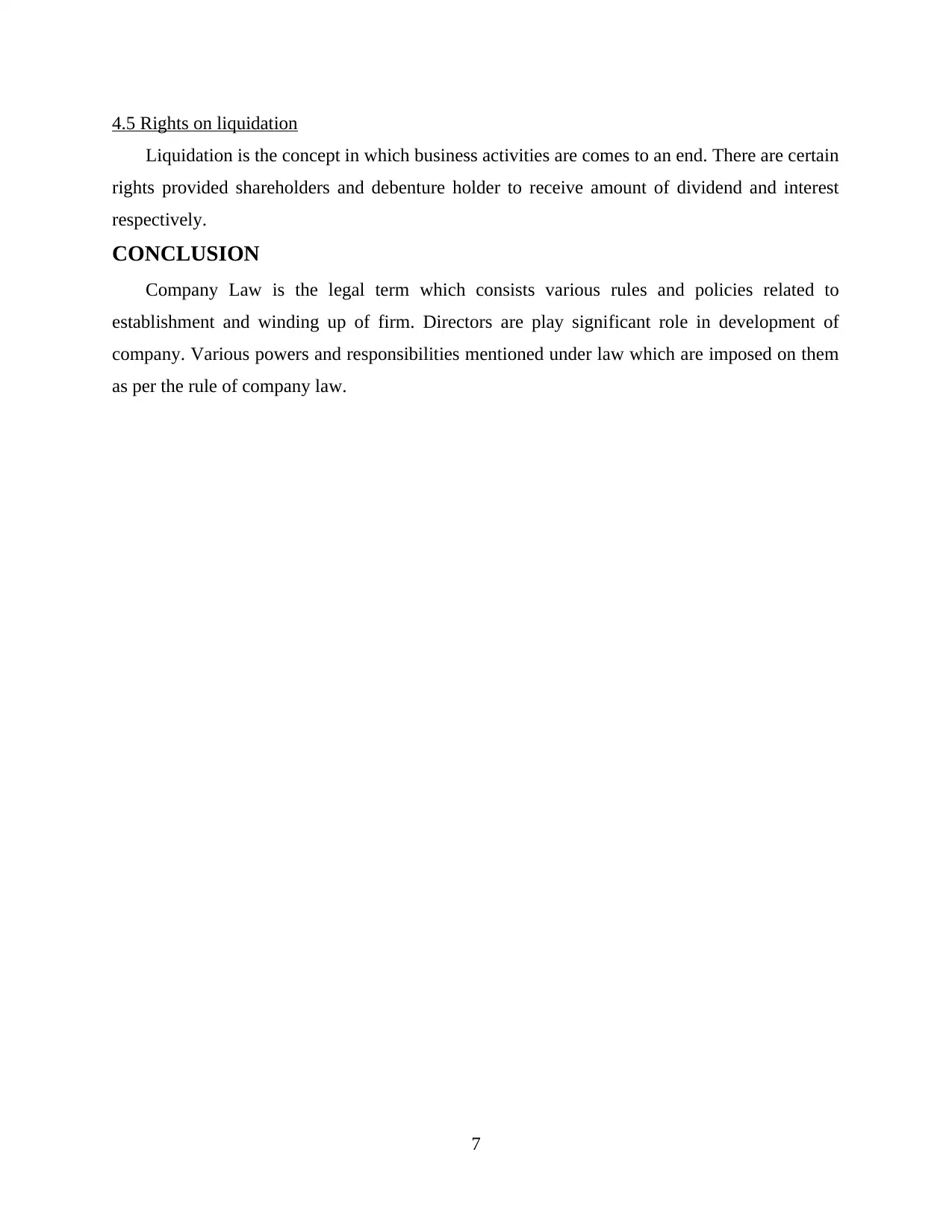
4.5 Rights on liquidation
Liquidation is the concept in which business activities are comes to an end. There are certain
rights provided shareholders and debenture holder to receive amount of dividend and interest
respectively.
CONCLUSION
Company Law is the legal term which consists various rules and policies related to
establishment and winding up of firm. Directors are play significant role in development of
company. Various powers and responsibilities mentioned under law which are imposed on them
as per the rule of company law.
7
Liquidation is the concept in which business activities are comes to an end. There are certain
rights provided shareholders and debenture holder to receive amount of dividend and interest
respectively.
CONCLUSION
Company Law is the legal term which consists various rules and policies related to
establishment and winding up of firm. Directors are play significant role in development of
company. Various powers and responsibilities mentioned under law which are imposed on them
as per the rule of company law.
7
⊘ This is a preview!⊘
Do you want full access?
Subscribe today to unlock all pages.

Trusted by 1+ million students worldwide
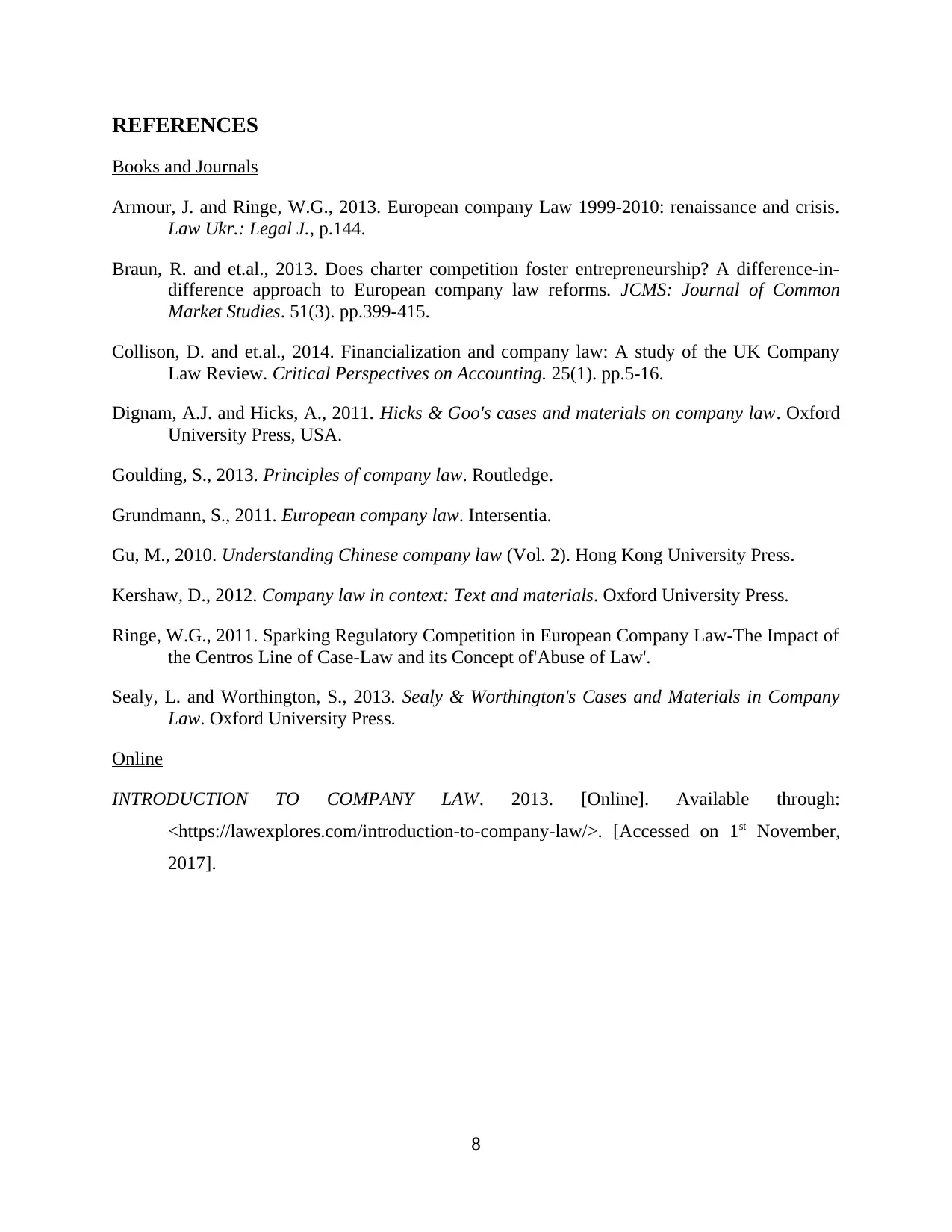
REFERENCES
Books and Journals
Armour, J. and Ringe, W.G., 2013. European company Law 1999-2010: renaissance and crisis.
Law Ukr.: Legal J., p.144.
Braun, R. and et.al., 2013. Does charter competition foster entrepreneurship? A difference‐in‐
difference approach to European company law reforms. JCMS: Journal of Common
Market Studies. 51(3). pp.399-415.
Collison, D. and et.al., 2014. Financialization and company law: A study of the UK Company
Law Review. Critical Perspectives on Accounting. 25(1). pp.5-16.
Dignam, A.J. and Hicks, A., 2011. Hicks & Goo's cases and materials on company law. Oxford
University Press, USA.
Goulding, S., 2013. Principles of company law. Routledge.
Grundmann, S., 2011. European company law. Intersentia.
Gu, M., 2010. Understanding Chinese company law (Vol. 2). Hong Kong University Press.
Kershaw, D., 2012. Company law in context: Text and materials. Oxford University Press.
Ringe, W.G., 2011. Sparking Regulatory Competition in European Company Law-The Impact of
the Centros Line of Case-Law and its Concept of'Abuse of Law'.
Sealy, L. and Worthington, S., 2013. Sealy & Worthington's Cases and Materials in Company
Law. Oxford University Press.
Online
INTRODUCTION TO COMPANY LAW. 2013. [Online]. Available through:
<https://lawexplores.com/introduction-to-company-law/>. [Accessed on 1st November,
2017].
8
Books and Journals
Armour, J. and Ringe, W.G., 2013. European company Law 1999-2010: renaissance and crisis.
Law Ukr.: Legal J., p.144.
Braun, R. and et.al., 2013. Does charter competition foster entrepreneurship? A difference‐in‐
difference approach to European company law reforms. JCMS: Journal of Common
Market Studies. 51(3). pp.399-415.
Collison, D. and et.al., 2014. Financialization and company law: A study of the UK Company
Law Review. Critical Perspectives on Accounting. 25(1). pp.5-16.
Dignam, A.J. and Hicks, A., 2011. Hicks & Goo's cases and materials on company law. Oxford
University Press, USA.
Goulding, S., 2013. Principles of company law. Routledge.
Grundmann, S., 2011. European company law. Intersentia.
Gu, M., 2010. Understanding Chinese company law (Vol. 2). Hong Kong University Press.
Kershaw, D., 2012. Company law in context: Text and materials. Oxford University Press.
Ringe, W.G., 2011. Sparking Regulatory Competition in European Company Law-The Impact of
the Centros Line of Case-Law and its Concept of'Abuse of Law'.
Sealy, L. and Worthington, S., 2013. Sealy & Worthington's Cases and Materials in Company
Law. Oxford University Press.
Online
INTRODUCTION TO COMPANY LAW. 2013. [Online]. Available through:
<https://lawexplores.com/introduction-to-company-law/>. [Accessed on 1st November,
2017].
8
1 out of 10
Related Documents
Your All-in-One AI-Powered Toolkit for Academic Success.
+13062052269
info@desklib.com
Available 24*7 on WhatsApp / Email
![[object Object]](/_next/static/media/star-bottom.7253800d.svg)
Unlock your academic potential
Copyright © 2020–2026 A2Z Services. All Rights Reserved. Developed and managed by ZUCOL.





